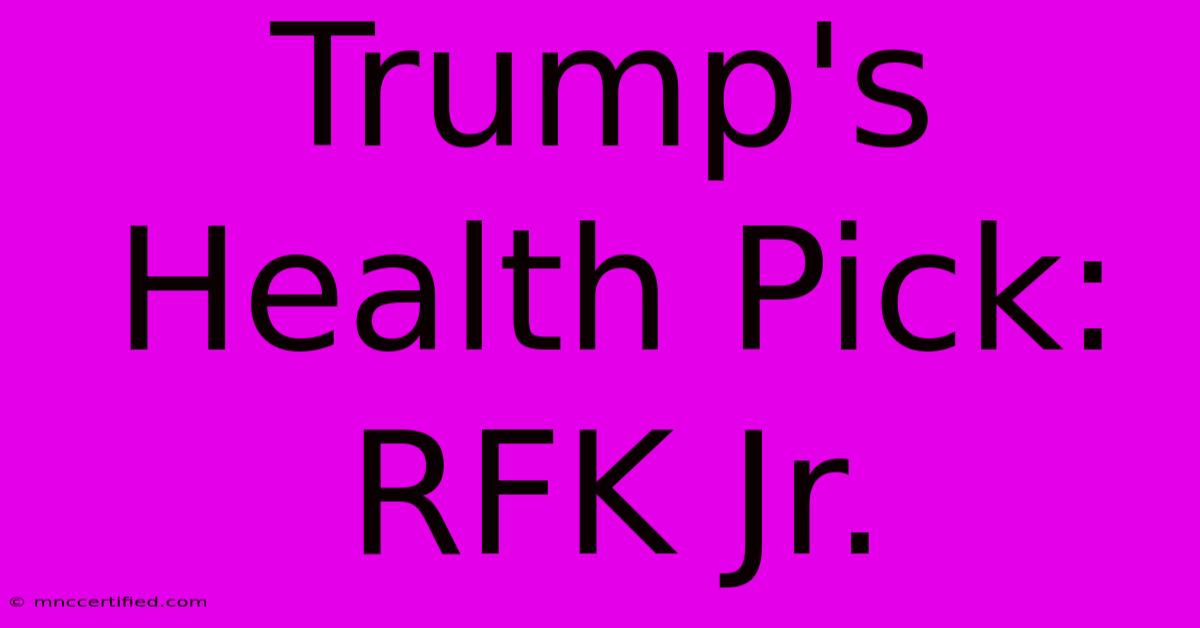Trump's Health Pick: RFK Jr.

Table of Contents
Trump's Health Pick: RFK Jr. – A Controversial Choice with Far-Reaching Implications
Robert F. Kennedy Jr.'s endorsement by Donald Trump as a potential health advisor has sent shockwaves through the political and medical communities. This unexpected alliance raises significant questions about the future direction of public health policy and the potential impact on vaccine hesitancy and misinformation. This article delves into the complexities of this controversial pick, exploring Kennedy's background, his views on vaccines, and the potential consequences of his influence.
Who is Robert F. Kennedy Jr.?
Robert F. Kennedy Jr., a prominent environmental lawyer and anti-vaccine activist, hails from one of America's most influential political families. While his lineage lends him a certain level of public recognition, his views on vaccines and public health have garnered significant criticism from the scientific community and public health officials. He's known for his outspoken advocacy against mandatory vaccination, a stance that has been widely condemned as dangerous and misleading.
Kennedy's Anti-Vaccine Stance: A Deep Dive
Kennedy's most controversial stance is his long-held belief that vaccines are unsafe and cause autism, a claim that has been repeatedly debunked by extensive scientific research. The overwhelming consensus within the scientific community is that vaccines are safe and effective, and the link between vaccines and autism has been disproven. Despite this, Kennedy continues to promote this misinformation, reaching a large audience through various platforms. This consistent propagation of false information poses a significant threat to public health, contributing to vaccine hesitancy and potentially leading to outbreaks of preventable diseases.
The Political Ramifications of Trump's Endorsement
Trump's endorsement of Kennedy sends a clear message to his supporters, many of whom already hold anti-vaccine sentiments. This public backing lends credibility to Kennedy's claims, further fueling vaccine hesitancy and potentially undermining public health initiatives. The political implications are far-reaching, potentially impacting future vaccination campaigns and the overall trust in scientific consensus. The move also raises concerns about the potential politicization of public health, a trend that has already caused significant damage during the COVID-19 pandemic.
Analyzing the Potential Consequences
The consequences of Kennedy's potential influence on health policy are multifaceted and potentially severe:
- Increased Vaccine Hesitancy: Kennedy's appointment could embolden anti-vaccine groups and significantly decrease vaccination rates, leading to outbreaks of preventable diseases.
- Erosion of Public Trust in Science: The endorsement further undermines the public's trust in scientific expertise and established medical institutions.
- Misinformation Amplification: Kennedy's platform provides a powerful megaphone for spreading misinformation, making it challenging to counter harmful narratives.
- Policy Impacts: His influence could lead to policy changes that prioritize unsubstantiated claims over scientific evidence, jeopardizing public health.
The Need for Critical Evaluation and Counter-Narrative
It is crucial for individuals and institutions to critically evaluate Kennedy's claims and actively counter the spread of misinformation. Promoting accurate information from trusted sources, like the Centers for Disease Control and Prevention (CDC) and the World Health Organization (WHO), is essential to combat vaccine hesitancy and ensure public health. Educating the public about the dangers of misinformation and the importance of evidence-based decision-making is paramount.
Conclusion: Navigating a Complex and Dangerous Situation
Trump's choice of RFK Jr. is undeniably controversial and raises serious concerns about the future of public health. The potential consequences of this alliance are significant and require a concerted effort to promote accurate information, combat misinformation, and safeguard public health. The situation demands careful consideration and a robust response from the scientific community, public health officials, and the general public. The debate surrounding Kennedy's involvement necessitates informed discussions and a firm commitment to evidence-based decision-making. The future of public health may depend on it.
Keywords: Robert F. Kennedy Jr., RFK Jr., Trump, vaccine hesitancy, anti-vaccine, public health, misinformation, political endorsement, health policy, vaccine safety, CDC, WHO, controversial, dangerous, scientific consensus, election 2024.

Thank you for visiting our website wich cover about Trump's Health Pick: RFK Jr.. We hope the information provided has been useful to you. Feel free to contact us if you have any questions or need further assistance. See you next time and dont miss to bookmark.
Featured Posts
-
Longorias Dystopian U S Remarks Explained
Nov 15, 2024
-
Taurus Full Moon November 2024 Astrological Impact
Nov 15, 2024
-
Alien Base Crypto Price Prediction
Nov 15, 2024
-
Weekend Supermoon Your Viewing Guide
Nov 15, 2024
-
Venezuela Holds Brazil To Historic Draw At Home
Nov 15, 2024